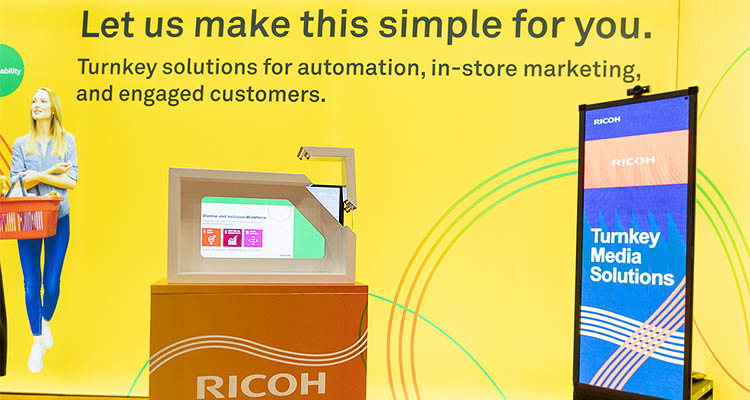
Carl Rysdon reveals the key to bridging the digital-physical divide while leading with a philosophy that puts people first
For my entire career, I have been committed to the retail technology space,” begins Carl Rysdon, Vice President of Retail Industry Vertical at Ricoh. “I started off in loss prevention, where my mission was to help retailers avoid theft, which eventually led me to broader retail solutions. Three years ago, I joined Ricoh to develop and drive our retail vertical strategy, a priority that remains central to our business to this day. Presently, I lead the part of our organization that serves top-tier retailers, including industry giants and half of the NRF 100.”
Throughout his three years (and counting) at Ricoh, Carl has developed his very own leadership style, characterized by his dedication to inspire teams and motivate others to excel. “My secret to successfully inspiring my teams is to align around a shared purpose and drive that forward together. Fostering extensive collaboration, my team and I constantly share useful information and insights with each other. Sales is a competitive environment, so it is crucial for everyone to recognize that they are part of the same unique team. As such, we help each other succeed, communicate openly, share some use cases and examples, and simply work together as one. With this approach encouraged across the entire retail team at Ricoh, we are all gathered under a common objective: supporting our retail customers to the best of our ability while continuously learning about each of them. Equally important is allowing individual creativity and finding ways to promote it, a critical way to drive engagement and participation across the team,” he emphasizes.
Under Carl’s leadership, retail giants are empowered to transform their operations and redefine the way they engage with their customer base. As Carl points out, Ricoh delivers a comprehensive suite of game-changing services across three critical areas: “First, we drive digital transformation, by enhancing business processes, making all data actionable, and integrating systems for cost-effective operations. Second, we enable our clients to optimize their workplaces and corporate offices, making them more efficient and productive environments to work in. Third, we specialize in producing in-store solutions, including graphics, printed materials, signage and other related products. As a global audiovisual leader, we are moving beyond basic digital screens to create immersive digital experiences in stores, which are more engaging. For example, some of our solutions allow customers to interact with Gen AI chatbots to obtain product information, view 3D displays, receive personalized promotions, or access augmented reality experiences via QR codes. In essence, we offer various products and services to empower retailers to communicate with customers on their terms through next-generation solutions,” he explains.

With many retailers already embracing digital transformation at varying levels, Carl highlights the benefits of Ricoh’s technologies and how they are revolutionizing retail operations. “Retailers juggle countless priorities while managing thousands of processes designed to deal with customers, vendors, supply chain, and legal entities. Essentially, they face a never-ending stream of inbound and outbound communications. Every industry vertical faces similar challenges, with teams dedicated to managing these complex workflows daily. This is where we step in. We begin with driving digital transformation by integrating printed and digital content, connecting systems, and most importantly, optimizing workflows. Our solutions are designed to streamline business processes, often removing unnecessary steps entirely.
“A classic case is making vendor invoices more seamless by intelligently routing documents to the right destinations, which eliminates the need for manual data entry and invoice scanning. By automating these time-consuming tasks, we accelerate processes while improving accuracy and security. As a result, retailers become more cost-effective, agile, and profitable, critical advantages for being a market leader and better serve customers. We have seen major retailers fail when their business models got stale. Sustainable success requires both operational excellence and the ability to adapt, which is exactly what our solutions deliver,” he continues.
Supporting sustainability
Beyond optimizing internal processes, retailers also leverage these solutions to improve customer experience in physical stores. Carl elaborates on how this works. “When looking at retail media in general, most spending goes into the digital realm. Yet the reality is that around 85 percent of purchases still take place in physical stores, making that investment seem highly disproportionate. One of the reasons why retail media dollars are not flowing into stores is the difficulty of measuring engagement. Hence, for brands trying to quantify return on investment (ROI), the store environment can feel like a black hole. To solve this, we empower retailers to truly connect with shoppers in-store, when they are most likely to buy something, in a way that allows them to measure engagement and ROI. Our Turnkey Media platform brings all these capabilities under one umbrella, so retailers do not need to patch together a solution. Every retailer we have worked with has found it challenging to manage technology at the store level, make it consistent across all their locations, and coordinate multiple vendors. Through Turnkey Media, we consolidate all of that into one program, which is the key to reaching shoppers at the exact moment they are ready to purchase,” he enlightens.
Amidst growing consumer demand for sustainable solutions and operations, retailers must prioritize clear communication and transparency. Carl shares his opinion on how retailers can continue to appeal to environmentally conscious customers by taking a proactive approach to sustainability. “In addition to offering sustainable products, retailers need to prove to consumers that they are operating sustainably in as many areas of their business as possible. Customers are interested in more than products made from recycled material; they expect transparency about a retailer’s broader environmental efforts. Ricoh is a leader in sustainability, and stands among the few companies recognized in this space. Consequently, retailers who partner with us inherently benefit from our sustainable practices.
“Many of the digital transformation and process automation solutions we are deploying further support sustainability for retailers by reducing their energy consumption, paper usage, and overall resource demands. True sustainability is about doing the right thing as a company, even when these efforts are not immediately visible to shoppers. It requires continuous improvement across all areas of the business. For environmentally conscious customers, providing visibility into these behind-the-scenes efforts towards achieving sustainability remains equally important,” Carl analyzes.
As we approach the end of our discussion, Carl seizes this opportunity to outline his vision for the future of retail and what lies ahead for the industry. “In the US retail market, there has been an increasingly evident focus on omnichannel and e-commerce strategies. But in truth, most retailers are struggling to turn a profit in e-commerce. This is because the vast majority of shoppers still prefer to purchase in person, as they enjoy being able to see and touch products before deciding to buy them. While some predicted the death of brick-and-mortar retail a few years ago, these forecasts have proven false. On the contrary, brick and mortar retailers are thriving and are likely here to stay forever. As social beings, we inherently value human interaction, which explains our enduring preference for in-store shopping.
“I believe that the future of retail lies in making the physical shopping experience more desirable by creating a more engaging and entertaining in-store experience while incorporating the flexibility of smart digital conveniences like click and collect. Blending these two approaches will be key to success in a retail environment. Overall, I expect that in the future, brick-and-mortar will continue to thrive, and digital tools will become smarter; not just through technological advances, but because they will be more intelligently deployed in the retail sector,” he concludes.